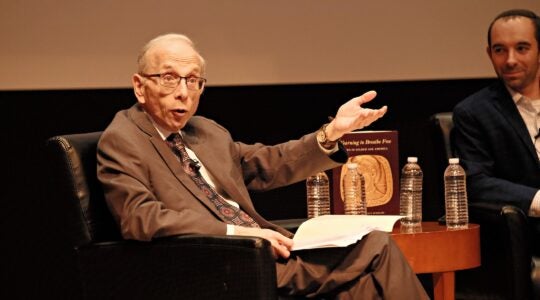He’s the prime minister, overseeing our entire government.
He’s our defense minister — supervising the struggle to prevent Iran from attaining nuclear weapons, the battle against Hezbollah in south Lebanon, the face-off with Hamas in Gaza and innumerable other challenges to our national security.
He recently gave up the job as foreign minister, but he continues to run Israel’s foreign policy — jetting off to meet the likes of UK’s Prime Minister Boris Johnson (last week), and Russia’s President Vladimir Putin (probably this week); closely coordinating relations with the Trump administration directly and via his trusted Ambassador to the United States Ron Dermer; flying to the Far East and Africa and hitherto unvisitable destinations in our own region.
He presides over Israel’s economic policy, dominating his neutered finance minister, highlighting the transition from Israel the land of Jaffa oranges to Israel the land of tech, innovation, cyber-skill.
He’s also, incidentally, our minister of Diaspora affairs, and, as of last week, our minister of welfare. He’s also formally our minister of health, since the United Torah Judaism party’s allegiance to Zionism extends only to allowing its leader to function as deputy health minister, and to attend cabinet meetings, but not to serve as a full-fledged minister in the government of the Jewish state.
How does Netanyahu do it? Where does he find the time, the required expertise, and, turning 70 next month, the energy?
Except that’s not all.
It’s Netanyahu who oversees campaign strategy. It’s Netanyahu who brokers pre-election deals with allies and rivals. It’s Netanyahu who determines quite how withering to be in pre-election delegitimation of Arab voters; Netanyahu who decides whether and how strongly to champion the deployment of party observers with cameras in polling stations
For the better part of the last year, he’s also been directing his Likud party’s efforts to retain power… in two elections — the April one in which he thought he’d won but merely turned out not to have lost, and the rerun that he, Avigdor Liberman and the two ultra-Orthodox parties imposed upon us.
It’s Netanyahu who oversees campaign strategy. It’s Netanyahu who brokers pre-election deals with allies and rivals. It’s Netanyahu who determines quite how withering to be in pre-election delegitimization of Arab voters; Netanyahu who decides whether and how strongly to champion the deployment of party observers with cameras in polling stations — even when the judge overseeing the elections and his own government legal adviser counsel against it.
It’s Netanyahu who campaigns more vigorously nationwide than any of his Likud colleagues, or most of his political rivals for that matter. It’s Netanyahu who stars in the Likud videos. It’s Netanyahu who blitzes the media with nonstop interviews in the final days of the campaign.
Except that’s also not all.
For almost three years, Netanyahu has been under investigation in three criminal cases, culminating in February’s decision by Attorney General Avichai Mandelblit to charge him with fraud and breach of trust in all three cases, and bribery in one of them, pending a hearing.
In addition to his national and party political responsibilities, then, Netanyahu has been overseeing his own defense as he battles to stay out of jail — answering investigators’ questions, marshaling his legal team, doing his best to control the narrative of these graft investigations as consumed by the public.
According to the draft indictment, furthermore, Netanyahu has over the years allocated sizable quantities of time to corralling as much of Israel’s media as possible to his own advantage — supplementing the support he gets from his own house newspaper Israel Hayom with, for example, favorable coverage from the Walla website, allegedly achieved via illegal quid pro quo deals with Walla’s owners, while also advancing an alleged, abrogated attempt at a quid pro quo deal with the country’s biggest media empire Yedioth Ahronoth.
And even that’s not all.
He also goes home every night to a wife, Sara, who has intermittent brushes with the law with which the prime minister must also grapple, and who champions her own political agenda — with reported blacklists of men and women whom the prime minister may and may not hire, fire, promote, and/or invite to join the Likud party.
He also has some parental responsibility for a son, Yair, who has become a major media presence in his own right, relentlessly stirring up political ferment on social media in a kind of online thuggery.
Being prime minister of Israel has to be one of the most challenging jobs on the planet. Even entirely reasonable decisions and policies can have catastrophic consequences. The margin of error is terrifyingly narrow. And Benjamin Netanyahu has held that post, and various others, while dealing with all manner of other distractions and drains on his time and his energy and his wisdom, for longer than any other Israeli ever, and without a break for the past decade.
He has no intention of stopping now.
Nobody knows how next week’s elections are going to play out. Israeli elections are impossible to predict at any time, with so many parties running and such small shifts potentially remaking the coalition arithmetic. But these elections are unprecedented — a second vote five months after the last, with all manner of unknowable consequences.
Any estimation of turnout, for instance, is pure guesswork. I’ve had countless people tell me in recent days they’re so sick of the whole business that they won’t be voting; I have no way of knowing which party they won’t be voting for. How will the Arab vote be affected by the rumpus over cameras in polling stations? Will the ultra-Orthodox share of the vote swell because the rabbis will ensure nobody stays home? How credible is Blue and White’s assertion that 170,000 of its potential voters will be overseas on election day?
And as the April fiasco showed, we may not even know who has won after the elections are over, when all the votes are in. Oh, how we laughed at Blue and White leader Benny Gantz for delivering a victory speech a couple of hours after the polls closed, when it was clear that the only exit poll giving him an ostensible path to a coalition was off mark. But oh, how the laugh was on all of us, and on Netanyahu, seven weeks later, when it turned out that the prime minister’s victory speech later that night was also unjustified, because that “leftist” troublemaker Liberman really had meant it when he promised not to join the coalition.
It becomes hard to give up on the devil you know. Unless the devil you don’t know is highly persuasive
Yet it would be a fool who would bet against Netanyahu.
Half a generation has grown up knowing nobody but him as their prime minister. When there are no term limits; when the Israeli psyche is not hardwired to know that, every now and again, the country changes its leadership; when the threats from without are so grave, complex and relentless, it becomes hard to give up on the devil you know. Unless the devil you don’t know is highly persuasive.
Many Israelis are deeply worried by Netanyahu’s demonstrable readiness to go low in order to stay in power. They’re troubled by his attacks on the Arab electorate, on the media, on ostensible enemies and coup plotters in his own party, on the cops, the state prosecutors, the courts and, now, on the electoral process. There has been no credible evidence of widespread fraud on past election days, and barely any credible evidence of minor infractions. Ensuring the integrity of the voting process, as the Supreme Court justice overseeing our elections has made clear, is in any case the task of the Central Elections Committee, not the competing political parties themselves, who are manifestly the least independent and the least reliable observers. Yet Netanyahu is disingenuously insisting that party officials brandishing cameras and smartphones to film at polling stations would bolster our democracy.
Some Israelis are troubled by the graft cases. Some are concerned that he may be skewing his handling of defense policy for political benefit, including by taking responsibility for Israeli military strikes overseas — and thus all but inviting an enemy response — where previously a policy of ambivalence had prevailed. Some worry that Israel, under Netanyahu and Donald Trump, has become a one-party cause in the US, and that our most vital alliance will start to fray come the day when there’s a Democrat in the White House. Some lament the fracturing of relations with a large part of Diaspora Jewry, amid Netanyahu’s refusal to curb the ultra-Orthodox monopoly over religious practice here and the governmental cold shoulder to non-Orthodox streams of Judaism.
Some Israelis are concerned at the growing centralization of power in Netanyahu’s hands.
But for many Israelis, too, that centralization of power, for so many years, renders the proposition of an Israel without Netanyahu at the helm, an Israel without its King Bibi, little short of terrifying.
In the April campaign, a party led by three former IDF chiefs of staff persuaded a chunk of the electorate that Israel would not be cut adrift without Netanyahu, would not be vulnerable without its longtime political king. A chunk of the electorate, but not a large enough chunk to dethrone him.
Gantz was slumped exhausted in the back of his car by the end of the campaign on election day; Netanyahu, sweating in his suit on the sands at Netanya beach, calling voters out of the water, was channeling the Duracell bunny. In April, Netanyahu looked like he wanted it more; nothing has changed on that front in the five months since.
Netanyahu would have us believe that Israel would be lost without him. His opponents argue that, with him, we are losing Israel. That is what next week’s elections are all about. At time of writing, Netanyahu, by fair means and foul, is making his case more energetically than his rivals. More effectively? We shall see.
The New York Jewish Week brings you the stories behind the headlines, keeping you connected to Jewish life in New York. Help sustain the reporting you trust by donating today.




